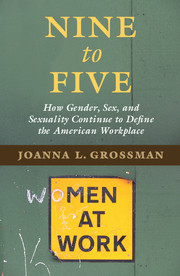Book contents
- Frontmatter
- Dedication
- Contents
- Foreword
- Acknowledgments
- Introduction
- PART I WHAT IS SEX DISCRIMINATION?
- PART II SEXUAL HARASSMENT
- 12 Workplace Affairs and Sexual Favoritism
- 13 Lolita at the Office
- 14 Sex Talk in the Writers’ Room
- 15 Sex Behind Bars
- 16 When the Supervisor Bullies Only Women
- 17 The Equal Opportunity Harasser
- 18 Periodontal Perils
- 19 Punishing Effeminacy
- 20 Late-Night Affairs with David Letterman
- 21 Why Herman Cain Has Not Been Able to Talk His Way Out of His Exploding Sexual Harassment Scandal
- 22 Why Hostile Environment Harassment Is a “Continuing Violation”
- 23 When Sexual Extortion Is Successful
- 24 The Consequences of Failing to Complain about Harassment
- 25 Who Is Responsible for Sudden, Severe Harassment?
- 26 Chinks in the Harassment Law Armor
- 27 Do Employer Efforts Prevent Harassment or Just Prevent Liability?
- 28 Who's the Boss?
- 29 Costly Mistakes
- 30 Hands Off the Merchandise
- PART III PREGNANT WOMEN AND MOTHERS AT WORK
- PART IV FEMALE BREADWINNERS AND THE GLASS CEILING
- Conclusion
- Notes
- Index
23 - When Sexual Extortion Is Successful
from PART II - SEXUAL HARASSMENT
Published online by Cambridge University Press: 05 May 2016
- Frontmatter
- Dedication
- Contents
- Foreword
- Acknowledgments
- Introduction
- PART I WHAT IS SEX DISCRIMINATION?
- PART II SEXUAL HARASSMENT
- 12 Workplace Affairs and Sexual Favoritism
- 13 Lolita at the Office
- 14 Sex Talk in the Writers’ Room
- 15 Sex Behind Bars
- 16 When the Supervisor Bullies Only Women
- 17 The Equal Opportunity Harasser
- 18 Periodontal Perils
- 19 Punishing Effeminacy
- 20 Late-Night Affairs with David Letterman
- 21 Why Herman Cain Has Not Been Able to Talk His Way Out of His Exploding Sexual Harassment Scandal
- 22 Why Hostile Environment Harassment Is a “Continuing Violation”
- 23 When Sexual Extortion Is Successful
- 24 The Consequences of Failing to Complain about Harassment
- 25 Who Is Responsible for Sudden, Severe Harassment?
- 26 Chinks in the Harassment Law Armor
- 27 Do Employer Efforts Prevent Harassment or Just Prevent Liability?
- 28 Who's the Boss?
- 29 Costly Mistakes
- 30 Hands Off the Merchandise
- PART III PREGNANT WOMEN AND MOTHERS AT WORK
- PART IV FEMALE BREADWINNERS AND THE GLASS CEILING
- Conclusion
- Notes
- Index
Summary
Suppose a supervisor threatens to fire a subordinate employee unless she submits to his sexual advances but never actually carries out the threat because she gives in. Should the employer be held automatically liable for the supervisor's sexual harassment?
In its recent opinion in Jin v. Metropolitan Life Insurance Company, the U.S. Court of Appeals for the Second Circuit addressed this very question. The decision is especially significant because the proper treatment of so-called submission cases has been up in the air since 1998, when the Supreme Court revamped the law of employer liability for sexual harassment.
THE TRIAL IN JIN: A QUID PRO QUO, BUT NO FIRING OR DEMOTION
The Jin case decided by the Second Circuit involved a “quid pro quo” relationship without a “tangible employment action.” The evidence showed that the victim was threatened with firing, initially submitted, and then, rather than being fired, ultimately left the company because of trauma from the harassment.
Min Jin was a successful life insurance sales agent for MetLife in New York City. Beginning in 1993, her supervisor was Gregory Morabito. According to the evidence presented at trial, Morabito engaged in a pattern of sexually harassing behavior from the beginning of their supervisory relationship.
Morabito, according to the evidence, made crude sexual remarks and touched Jin's breasts, butt, and legs in a sexual manner. He also required her to attend private Thursday night meetings in his locked office – during which he would threaten her with a baseball bat, kiss, lick, bite and fondle her, attempt to undress her, and physically force her to unzip his pants and fondle him.
Morabito repeatedly threatened to fire Jin if she did not give in to his sexual demands. For several months, Jin submitted for fear of being fired. But eventually she refused, changing her schedule to avoid him. In the end, Jin left the company, and tried to collect disability benefits because of the effects of the harassment. Ultimately, MetLife fired her because, the company said, she had stopped coming to work without having approval for disability leave.
WAS THE JURY RIGHT TO FIND NO LIABILITY IN JIN'S CASE?
The jury found that MetLife had taken adequate measures to prevent and correct the problem. In addition, it also found that Jin had unreasonably failed to take advantage of corrective opportunities. Accordingly, it entered a verdict of “no liability” on Jin's claim.
- Type
- Chapter
- Information
- Nine to FiveHow Gender, Sex, and Sexuality Continue to Define the American Workplace, pp. 136 - 139Publisher: Cambridge University PressPrint publication year: 2016



